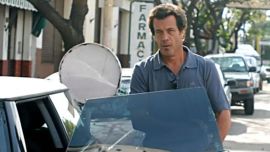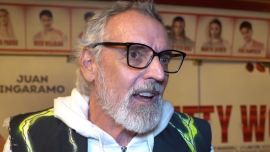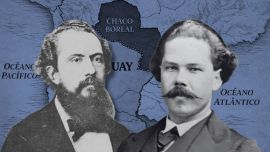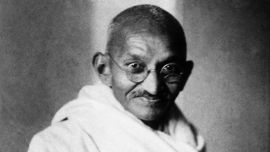It seemed as though those gathered in the crowd knew this might be their last chance. The last chance to chant “Sí se puede!” and dream their dream. The last time to wrap an Argentine flag around their shoulders and bellow out the national anthem before their leader, swaying in unison. The last time they’d see Mauricio Macri, donning his signature light blue button down shirt, take to the stage and rally his supporters around his pro-business, anti-Kirchnerite agenda.
Beneath all the fanfare though, many attendees of Saturday’s “March of a Million” at the Obelisk in Buenos Aires were resigned to President Macri’s defeat on October 27. “For the good of my grandkids, I hope to God he doesn’t lose. But, unfortunately, I think it’s obvious he will,” one woman on Avenida 9 de Julio told the Times, speaking on the condition of anonymity.
Much of their worry stems from President Macri’s dramatic defeat to the Frente de Todos ticket, headed by Alberto Fernández and Cristina Fernández de Kirchner, in the August 11 PASO primaries. The results were a surprise to much of the country, and certainly among Macri’s loyalists, with Fernández, a former Cabinet chief, emerging triumphant with a 16-point lead.
Less than two weeks after that, supporters gathered in front of the Casa Rosada in Buenos Aires to show they remained resolute. The campaigning has continued unfettered, and crowds have turned out for Macri, but pollsters warn the numbers haven’t shifted.
In his speech Saturday evening, President Macri thanked the crowd for the moment they had given him, saying it was the genesis of this 30-cities-in-30-days tour. To date, his comments at these events have been characterised by a certain degree of self-flagellation, riddled with acknowledgments of his mistakes and apologies for missing the plight of Argentina’s working and lower classes. “I hear them,” Macri has said regularly, referring to such concerns.
But the tone and tenor of President Macri’s remarks at this final rally marked a significant departure. If he has any doubts about his ability to win on Sunday, he didn’t concede them.
The crowd, a raucous, high-energy sea of blue and white, did not want to hear his regrets. They’d gathered to hear a war cry.
The president gave them just that. “We are here to say that we aren’t going to stay calm while that kind of power, rejected by so many Argentines, returns. We aren’t going to let them steal our future,” he shouted, voice cracking after weeks on the road.
The crowd met him with passionate screams, chants and vigorous waves of the flag.
The incumbent didn’t step on stage until 6.30pm, almost an hour and a half after the advertised start time. In the interim, the crowd grew restless, fuelled by some combination of passion, exhaustion, fear and desperation. A slight nudge would be seen as a provocatory push deep inside the crowd, and passing without saying “Excuse me,” an immediate escalation.
“Are we animals or are we humans?” one bystander shouted as throngs of people moved to occupy an increasingly tight space towards the centre. A few women, one of whom was pregnant, were carried through the masses to standby ambulances on the verge of fainting.
For most, however, the physical discomfort was more than worth it.
“We’re not just fighting for a better economy or for an end to corruption. We’re fighting for the future of our country and our way of life.” said Eduardo Sunner, 47, a lifelong resident of Buenos Aires. “If we lose, this city especially is going to suffer tremendously.”
When President Macri finally stepped on stage, he spoke of a more hopeful future, one in which Peronismo and Kirchnerismo were resoundingly rejected, never to return.
“This hard work was all worth it and we are now more prepared to grow. I’m telling you that a new age of relief is coming for all Argentines because of what we have already done,” he said.
Though the official remarks did not mention Fernández de Kirchner, it was evident that the mere notion of her return to power was animating many voters’ fierce opposition to the Frente de Todos ticket. Television footage showed one attendee punching a mini inflatable doll, bearing the former president’s image.
Sunner even said if “she” — almost never referred to by her name — wasn’t on the ticket, a Macri loss wouldn’t scare him nearly as much.
“We have to decide if we’re a democracy or if we’re a republic under a dictator,” said Juan Ignacio Vidal, 36. Though he cited the economy as one of his primary concerns with this election, the reality, Vidal said, is that this is a fight for freedom. As he spoke, his group of five friends chimed in with a laundry list of problems they feel another Fernández de Kirchner government would deliver: violence, restrictions on the press, drug-trafficking, fascism.
As they did so, one woman even yelled from afar: “Under her, we will become a state like Venezuela!”
Estimates vary about the size of the crowd on Saturday but it’s clear that it was not emblematic of Argentina’s demographic reality. The general make-up of the crowd appeared decidedly upper class and ageing — some gentlemen even sporting full suits in the heat. They were, perhaps, representative of a bygone age where Buenos Aires was seen as the romantic, sophisticated “Paris of South America,” rather than the capital of a country chronically plagued by economic crisis and political chaos.
“Yes, there’s poverty, but it’s nothing like what we saw in the early 1980s,” said Patricio Villanueva, 61, a lifelong porteño, who went on to express fears of curtailed personal freedoms under a potential 'Fernández-Fernández' administration.
Argentina is a young democracy that’s still trying to gain institutional legitimacy and strength, he argued.
Others seemed impervious to recent statistics about Argentina’s economic tailspin.
“There is no new poverty in Argentina. There is no new hunger in Argentina. Not here in the city, not in the rural provinces,” said Silvana Franzini, 56, brushing off recent data from the INDEC national statistics bureau indicating that poverty had risen to affect 35.4 percent of the population.
Comments like these are foil for Fernández and Fernández de Kirchner, who have sought to paint Macri as a leader who stands an arms-length away from Argentina’s poorer, working class.
“It’s great that Macri decided to meet with his supporters without without barriers," Fernández said in an interview over the weekend, reported in various local outlets. "But afterwards, the reality is that while the plaza may have been full, the refrigerators are empty,”

























Comments